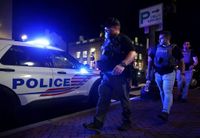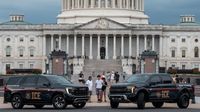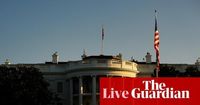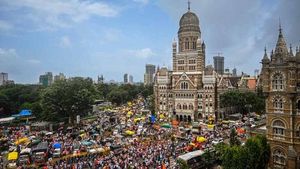On August 15, 2025, the simmering tensions between Washington, DC’s elected leadership and the federal government burst into the open as the city filed a lawsuit to block President Donald Trump’s unprecedented federal takeover of its police department. The legal challenge, spearheaded by D.C. Attorney General Brian Schwalb, came just hours after the Trump administration named a federal official as the new emergency head of the Metropolitan Police Department (MPD), escalating a week-long intervention that has sent shockwaves through the nation’s capital.
Schwalb, in a statement on Friday, described the moves as “brazenly unlawful,” arguing that they “go well beyond the bounds of the President’s limited authority and instead seek a hostile takeover of MPD.” He added, “They infringe on the District’s right to self-governance and put the safety of DC residents and visitors at risk.” According to Democracy Docket, the lawsuit contends that Trump’s actions threaten to “upend the command structure of MPD and wreak operational havoc within the department, endangering the safety of the public and law enforcement officers alike.”
The legal battle centers on Section 740 of the Home Rule Act of 1973, which allows the president to request the use of the MPD for federal law enforcement purposes during emergencies, but strictly limits such authority to 30 days and requires that operational control remain with the city’s mayor and police chief. Before this week, the provision had never been invoked. Schwalb’s lawsuit alleges that the Trump administration has already taken steps to extend federal control far past that 30-day limit. DEA administrator Terry Cole, newly appointed as “emergency police commissioner,” reportedly obtained an MPD badge with an expiration date of August 13, 2026.
The city’s top officials have been outspoken in their opposition. Mayor Muriel Bowser took to social media to assert, “There is no statute that conveys the District’s personnel authority to a federal official.” She clarified, “Let us be clear about what the law requires during a Presidential declared emergency: it requires the mayor of Washington, DC to provide the services of the Metropolitan Police Department for federal purposes at the request of the President.” Bowser’s stance reflects a broader concern that the Trump administration’s actions undermine the city’s hard-won right to self-governance, enshrined in the Home Rule Act since 1973.
Chief Pamela Smith, who was abruptly sidelined by the administration’s move, sounded the alarm in a court declaration: “In my nearly three decades in law enforcement, I have never seen a single government action that would cause a greater threat to law and order than this dangerous directive.” Smith also revealed she was unaware of Trump’s plan to assume control of the MPD until he announced it at a press conference earlier in the week, underscoring the lack of communication and coordination with city leadership.
U.S. District Judge Ana Reyes, who was assigned the lawsuit and appointed by President Joe Biden, indicated during a Friday hearing that the law likely does not permit the Trump administration to fully take over the city’s police force. However, she acknowledged that the president may have broader authority than the city would prefer. “The way I read the statute, the president can ask, the mayor must provide, but the president can’t control,” Reyes stated in court, as reported by the Associated Press.
Attorney General Pam Bondi, representing the Trump administration, argued that the president has broad authority to determine the level of cooperation MPD must provide to federal authorities. On August 14, Bondi issued a directive appointing DEA administrator Terry Cole as the new head of the MPD, rescinding previous orders that limited police cooperation with federal immigration enforcement. Bondi’s directive explicitly revoked MPD policies that restricted inquiries into immigration status and prevented arrests based solely on federal immigration warrants. All new directives, she said, would now require Cole’s approval.
The impact of these sweeping changes was immediately felt on the streets. By August 14-15, more than 1,750 federal law enforcement officers and National Guard troops had been deployed across Washington, DC. According to a White House official, the operation resulted in 33 arrests, including 15 migrants without permanent legal status and others on serious charges such as murder and rape. The sight of National Guard troops stationed outside landmarks and Humvees parked at Union Station marked a stark shift in the city’s atmosphere.
For many DC residents, the takeover and the visible show of force have been deeply unsettling. On Friday, more than 100 protesters gathered outside police headquarters, chanting “Protect home rule!” and waving signs reading “Resist!” CNN reported that demonstrators included people like Katie Garcia, a 29-year-old resident of Ward 2, who said, “With Trump’s takeover, I felt what’s going on in DC is terrifying.” Another protester, Marta Ames, 74, who has lived in the city since the 2000s, expressed, “I’ve never seen anything like this. I was stunned. I mean, I’m someone who believes in my First Amendment right, and we know he does not believe people should protest against anything he does.”
Michael Segal, a 64-year-old Capitol Hill resident, described a climate of fear and uncertainty: “The fact that I’m walking down the street, and I can get stopped for my papers at any time … it’s just mind boggling to me.” The increased federal presence has led to reports of people being stopped and asked for documentation to prove their US residency, a scenario that many long-time residents find unprecedented.
Immigrant advocates are also grappling with the implications. Anusce Sanai, associate legal director for the nonprofit Ayuda, told the Associated Press, “We are triaging how to advise clients and the community at large. Even with the most anti-immigrant administration, we would always tell our clients that they must call the police, that they should call the police. But now we find ourselves that we have to be very careful on what we advise.”
The Trump administration has defended its actions as necessary to address what it calls a crisis of violent crime in the capital. Yet, as Democracy Docket points out, data from DC police indicate that crime is actually in decline, challenging the administration’s justification for such a sweeping intervention. Critics argue that the federal takeover is less about public safety and more about testing the limits of presidential authority, especially regarding immigration enforcement and the use of obscure statutes during a self-declared emergency.
As the court battle unfolds, the fate of DC’s police department—and the broader principle of local self-governance—hangs in the balance. For now, residents, city officials, and legal advocates are bracing for what comes next, as the capital becomes the stage for a historic clash over federal power and local autonomy.






